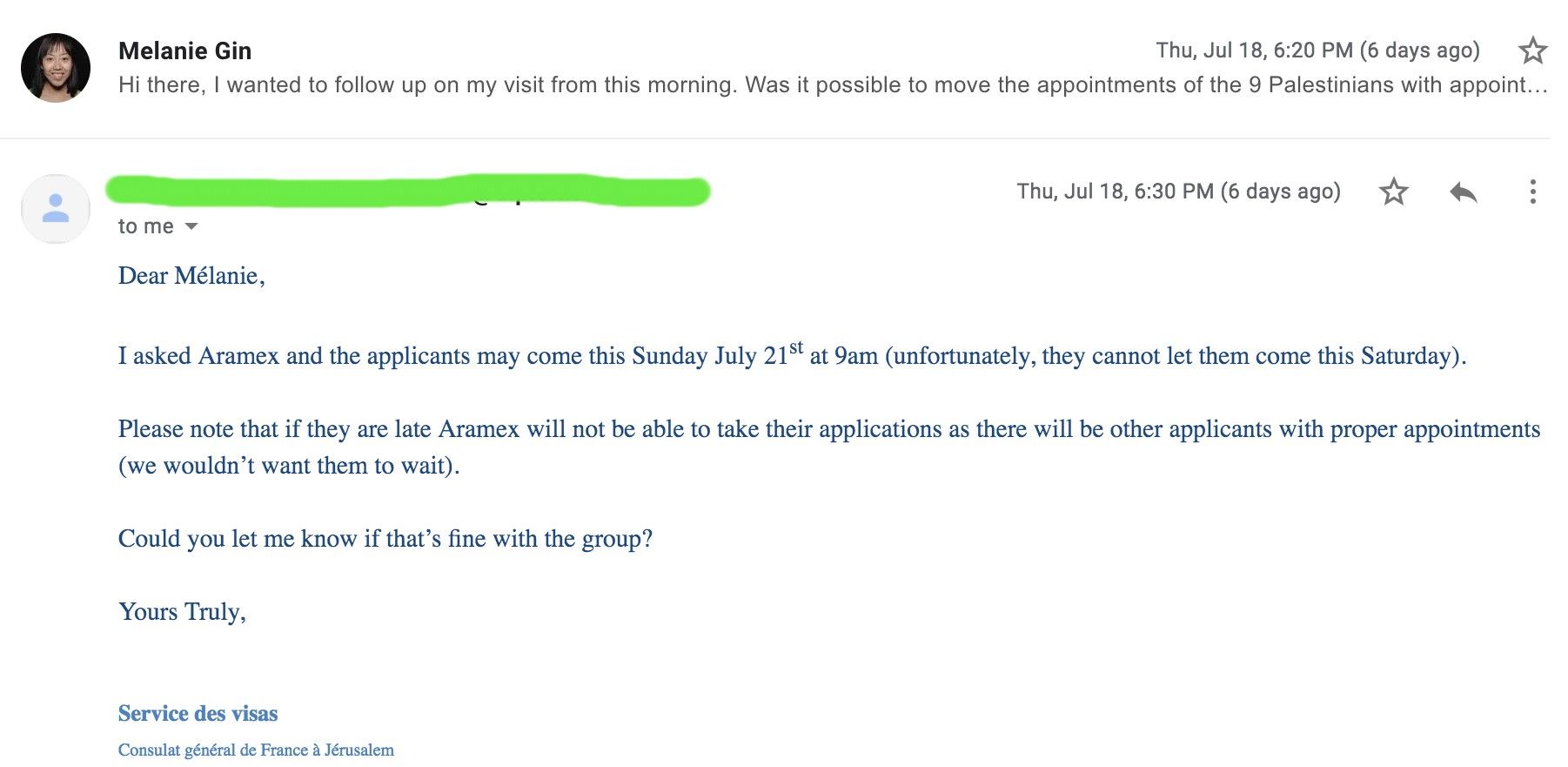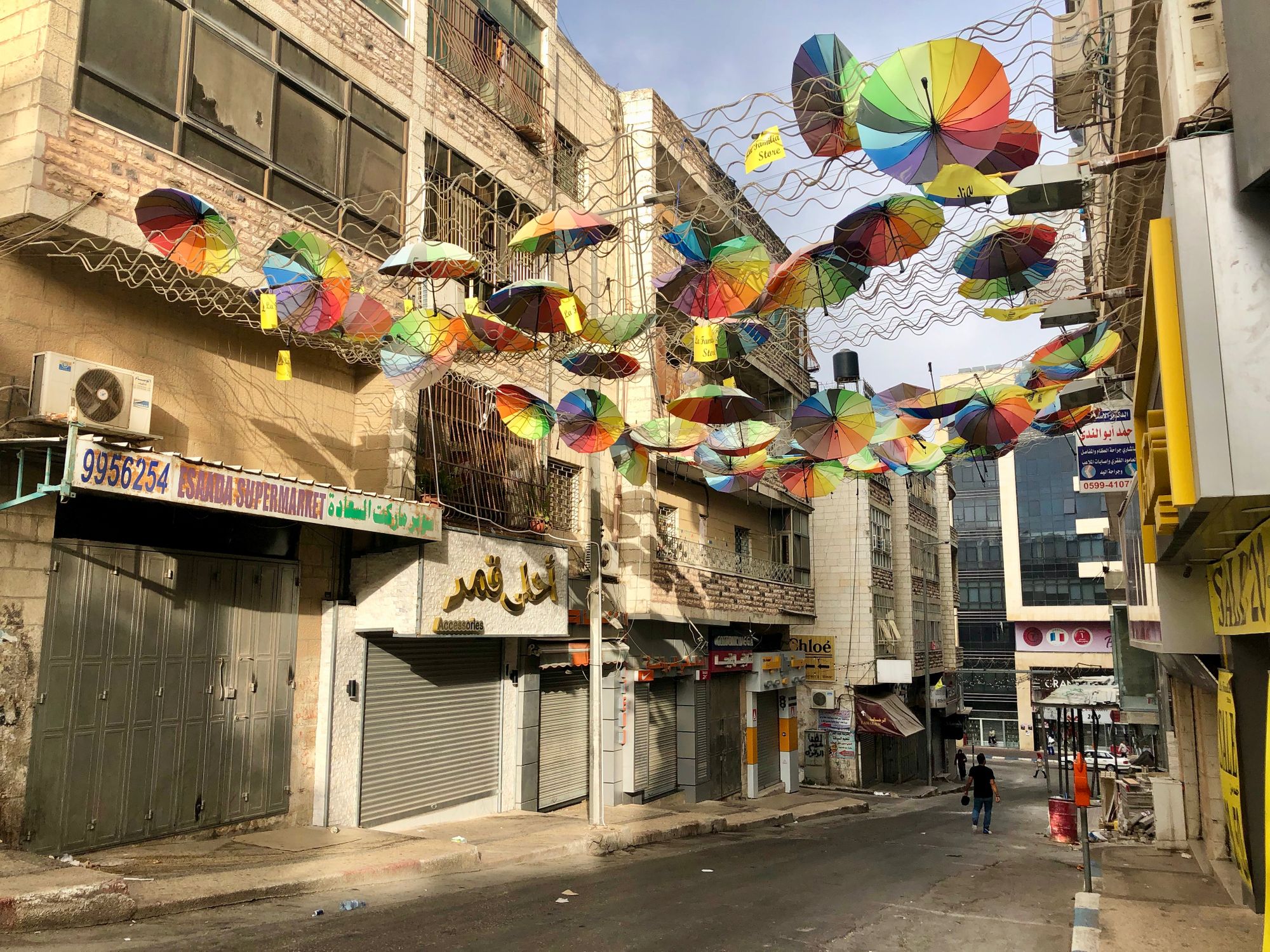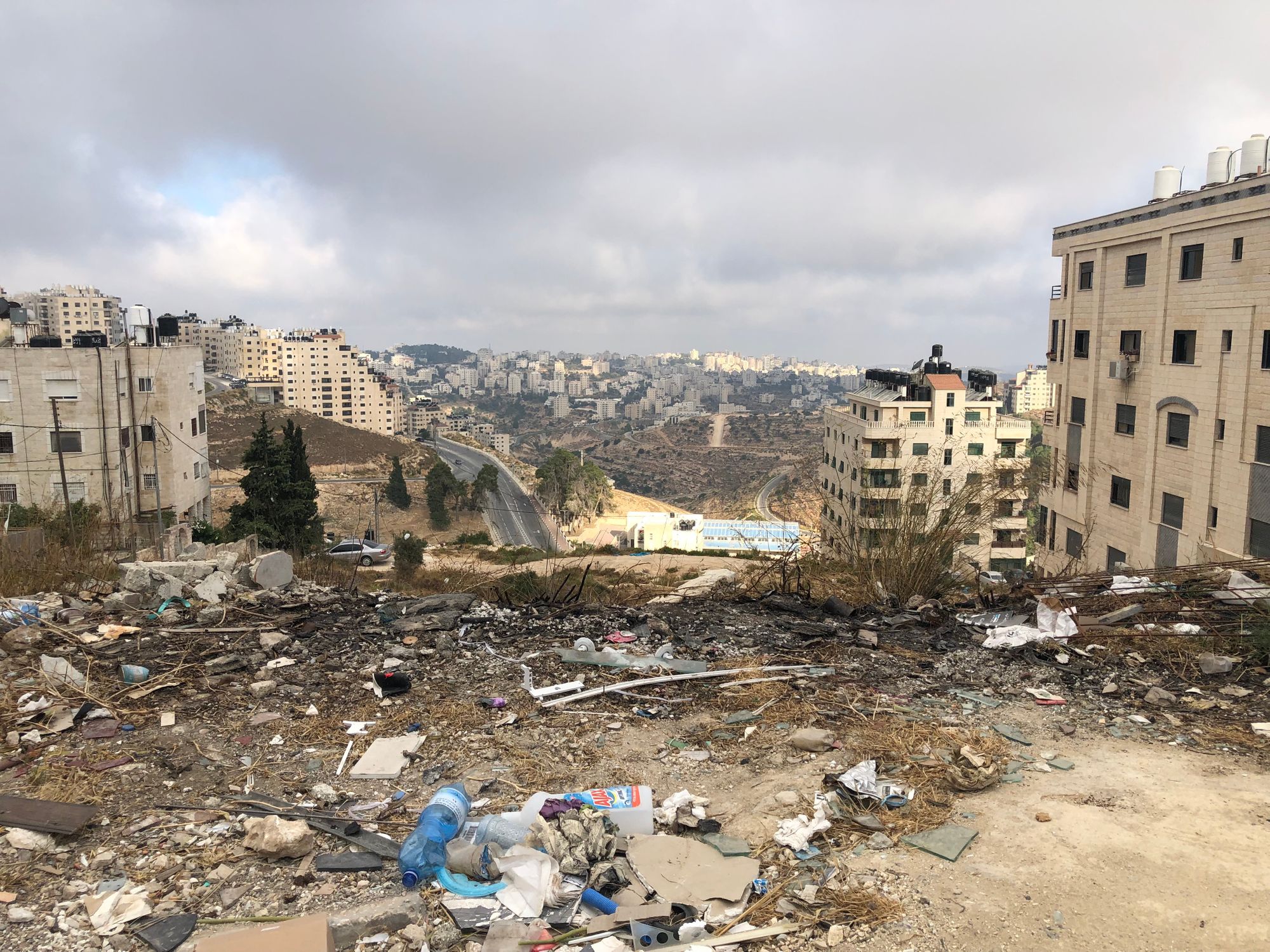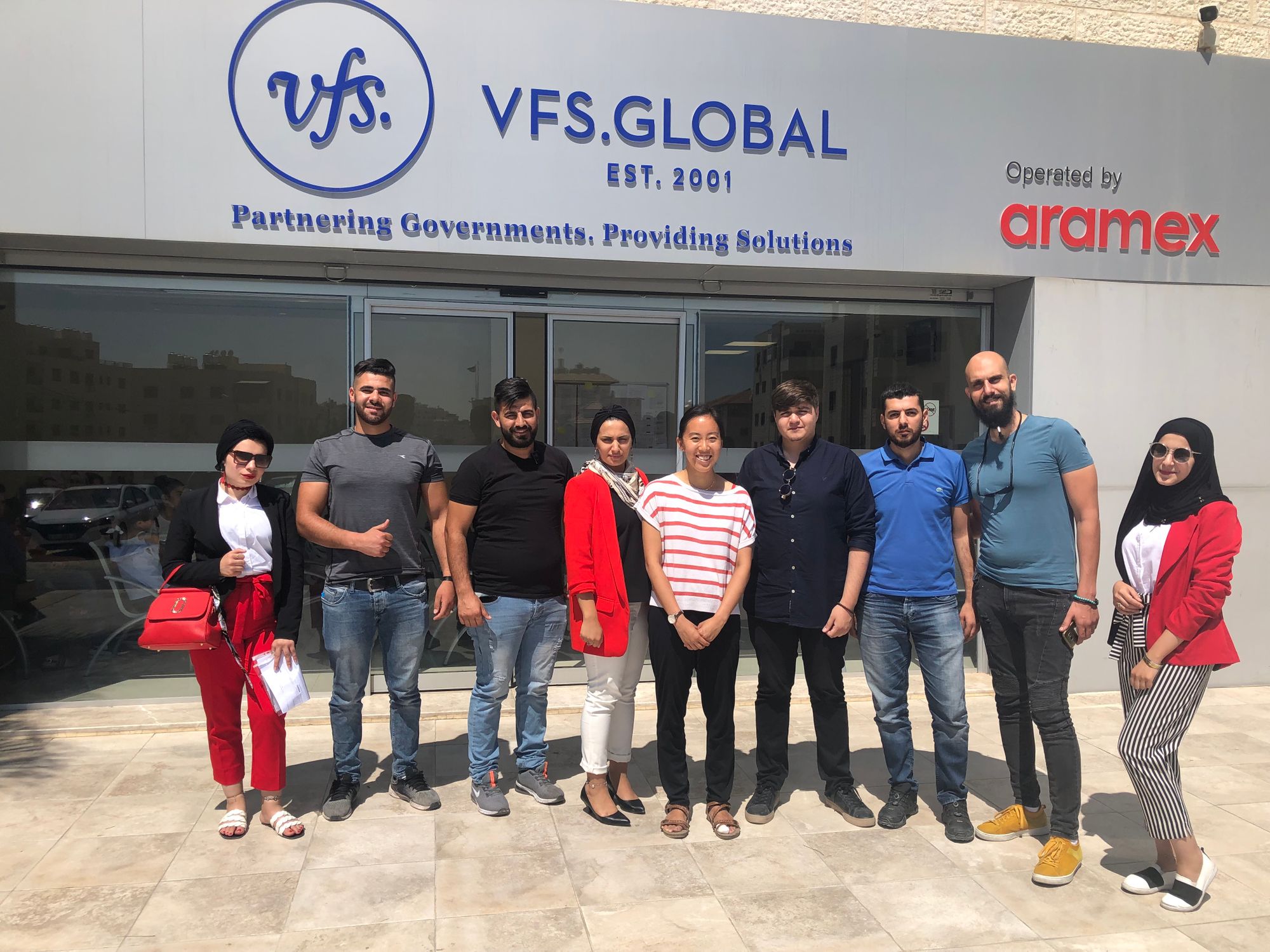The race to submit eight Palestinian visa applications in time for waking up at Plum Village
In two weeks, I will journey with a group of Palestinian and Israeli friends to Plum Village, a Buddhist monastery near fields of clay and sunflowers in southern France. We'll participate in the Wake Up Earth retreat, a gathering of 600 young people from all over the world, sharing aspirations, meals, and joy for one week in nature. We are deep in the preparation process now.
For Israelis and Americans, the process is simple: request time off from work, book a cheap flight from Tel Aviv, register for the retreat. Preparation is far more muddy for our Palestinian friends, who are tasked with collecting stacks of personal documents, applying at the consulate in Ramallah, and waiting three weeks for French visas.
Each Palestinian must account for every day they are in France, show proof of booked flights and paid accommodation, print three months of bank statements, and collect letters from work or school commitments in Palestine. Health insurance must cover 35,000€ in emergency medical treatment.
Last Sunday, eight Palestinian friends and I arrived in Ramallah at the French consulate to participate in this visa process. Due to a series of mishaps, the Palestinians hadn’t yet applied for French visas three weeks prior to our trip. Sunday was our day of reckoning.
I was on edge, riding on adrenaline, ready for a long nap. It was good news from the beginning: the consulate officer in Jerusalem had called Ramallah to schedule us appointments, and the office staff met us with warmth and patience. Each Palestinian application was painstakingly reviewed, adjustments made, fingerprints provided. 422 shekels was collected for each applicant. The outcome was eight successful applications in the capable hands of Manuel, the consulate officer in Ramallah.
When it was all over, I headed home to Bethlehem with Firas, Amir, and Ahmed. “They think we’re all terrorists,” someone said. I was silent, letting my body digest the sorrow and truth of the words. Yes, let us not forget that underneath the joy of our successful ordeal is the question of its necessity.
Dear ones, why must my Palestinian friends prove that they're not flight risks or terrorists while I get a free pass into France? Why does the burden rest so heavily on those with the least privilege? And what about those I cannot see, who have given up long before the visa office?
I mourn the curiosity and optimism of a young person asking about what life is like outside of Palestine, unable to imagine the vastness of open fields or the greenness of a forest. The young people who, by nature of their birth, may never experience the freedom of wandering the earth. And I mourn the dignified acceptance of the Palestinian elder, who has learned through time that this is their reality.
Why do I erect borders around my own heart?
I see too that countries are not the only ones that erect borders to guard against the possibility of terror. Out of fear and a desire to stay safe, I build my own walls around my heart, with judgment and insecurity the guards at my borders. I dismiss so many I meet immediately: they don’t share my values, they subjugate their women, they refuse to acknowledge the occupation in their backyard. They’re not self-aware, not educated, too young, too old. They’re tourists unaware of the conflict. They’ve been here forever and have given up.
I want proof that friends and communities are safe, able to withstand conflict and confusion, loving and compassionate to myself and to others. I want to see certifications in self-awareness, humility, and listening. If there were documents to guarantee I would never be hurt or disappointed, I would request those too.
I am not unlike a country with strict passport control.
Walking alongside my Palestinian friends for the past days — visiting the Jerusalem consulate, compiling paperwork, photocopying to the nth degree – I see that France wants undeniable proof that each applicant is safe, not planning to illegally immigrate, or to live off of French public funds. I see that this immense burden of proof allows only those most committed and resourced to pass through: those with the language skills, financial capacity, and know-how to complete the arduous application process.
In my own life, I see how my judgments and restrictions compose an ever-narrowing set of conditions to enter my heart. I see how allow only the most “qualified” are able to pass: those already like me in values, culture, or spiritual practice. Others have a rocky passage, and most -- due to lack of time, commitment, or energy -- fall away before success.
I know too that consistency, emotional safety, and spiritual depth are the most direct pathways to my heart. These traits are like an American passport to French border police, allowing me to trust and love others more easily. Can I allow these feelings of trust and wellbeing to arise naturally with more types of people, easing the initial border restrictions until I know more? Can I accept more invitations for tea, board games, dinner, yoga? Can I initiate more of these interactions too?
This Palestinian visa process has offered me this gentle reminder: that strict border requirements – to cross into countries or hearts – can exclude the most gentle and loving souls. I will be more aware of my own habitual behaviors to protect my vulnerable and open heart, and try to open the gates a little more often.
The Palestinian visa process: a deeper look at the timeline of events
The story begins last Thursday, days before we've managed to submit visa applications, or even secure appointments that give us enough time for processing and pickup before our flights on August 7th. My friend Lisa and I are brainstorming ways to increase chances that visas will come through on time.
Thursday July 18 at 6am. I awake to texts from Lisa asking if I can please stop by the French consulate this morning. Ask for expedited service, to move our appointments up, or to submit our papers in Jerusalem, she says. It sounds crazy. She knows it but is not willing to give up on our friends. Okay, I agree. Why not give it a try?
Thursday at 8:45am. I arrive at the French consulate in Jerusalem pretending to drink an imaginary mocha. It's a good luck charm, and today it seems to work. I meet Damien, a French consulate officer whose initial grumpiness gives way to quiet compassion. He offers to call the Ramallah office to try to move our appointments up. In any case, he says I can pick up the completed passports in Jerusalem instead of waiting for them in Ramallah, which will save a week of transit time. I leave with hope and splurge on a real hot chocolate for luck.
Thursday at noon. Amir, Abdallah, Firas, and I attempt to page through eight applications in various states of completion. Donna has handed to me a partially completed page of notes for each person, stating which documents are missing. We go through each application anyways, outline what's needed on yellow sticky notes, and call each person to confirm.
Thursday at 7pm. Damien from the French consulate has come through! He’s sent an email asking if we can do Sunday morning at 9am. I refrain from sending a reply with ten exclamation points or a marriage proposal.

Saturday afternoon. Abdallah and I spend hours photo-copying and sorting eight applications. Again. Over mint tea and orange juice, we confirm that the eight packets are complete, minus documents that our friends will carry with them to Ramallah on Sunday.
Saturday at 4pm. I am headed to Ramallah via Arab bus 418, one day before we gather for the critical appointments at the French consulate in Ramallah.
I'm terrified. Soon, I will cross the Qalandia checkpoint from Jerusalem into Ramallah for the first time. Eight Palestinian visa applications are tucked in my backpack. I have to remind myself that I’m not smuggling illegal documents or otherwise breaking the law. I craft a story to explain to an imaginary Israeli soldier why I’m carrying Palestinian passports across the border. I ask Amir’s mom and Sister Luc Nghiem to pray for me.
On the bus, I meet Rami, a young man originally from here now residing in Chicago. I guess correctly that he is Palestinian and reveal my situation. He informs me that he can speak Arabic and jostles back to the front of the bus to ask if we will drive through the checkpoint. The answer is no. We will stop in front of it and walk through ourselves. I must look terrified because he consoles me: we'll do it together, I’ll look after you.
Saturday at 4:30pm. With Rami beside me, I walk towards the metal turnstiles at Qalandia, focused on staying calm. There isn’t a single soldier that stops us, asks for my passport, or tries to intimidate me. Rami turns to me, grinning. “Must be Shabbat, the place is empty.”
Welcome to Ramallah. Sand and gravel hang in the air, cars are honking, and people are rushing to catch the bus into town. The city center is bustling. People are celebrating Tawjihi exam results with fireworks that sound like gunshots.
I arrive at Habibi Hostel and settle in. The place is classic Arab: stone walls, arching ceilings, grapevines lining the backyard. My friend Wael arrives, he’s one of the Palestinians applying for visas come Sunday morning.
Our mission is deceptively simple: find the French visa application office, coordinate a location to meet our seven Palestinian friends, and make sure everyone shows up with the correct paperwork and money in hand. Maybe it doesn't sound simple.
We set off on our mission. The place Wael remembers as the visa office is abandoned, the location changed. Thank goodness we’re here a day early. For my American and European friends: finding locations in Palestine is not as simple as using Google Maps. Places don't have addresses, are on unidentified roads, or otherwise don't exist on Google.
Wael spends dinner calling various friends asking about the location. I spend dinner talking to Lisa, explaining why Ahmed has decided last minute not to come. Lisa calls him right away and we reconvene to strategize. Dinner ends.
We start walking in the direction of where Wael believes the office to be. It is a thirty-minute walk in the dark. Ramallah is alive. I am suddenly homesick for the energy of San Francisco and London. We arrive at the building, store the location on our phones, and settle on the Palestine Tower as our meeting point. Time to crash at the hostel.


Sunday at 7:45am. I’ve woken up with the sun and am now approaching Palestine Tower on foot. Parked halfway on the sidewalk is a car full of friends, waving. Firas, Omar, Ahmed, and Amir are here fifteen minutes early. Good sign. We scavenge for breakfast and head to the visa office by 8:30am. Thirty minutes early.
I approach the counter, wondering if Damien has managed to submit our names to Ramallah. The kind security man asks me to write my name on a slip of paper and hands it to the guy behind the desk. Apparently it works. A few minutes later, the Plum Village letter is procured and we are invited inside. The five boys settle in the plastic waiting room chairs.
Ahmed goes first. Everything goes smoothly until the consulate officer Manuel asks us for a blank receipt. Ours is written on, with checkmarks, underlines, swirls. We don’t have it, our travel agent Donna does but it’s Sunday morning and she’s sleeping. I try to call, she doesn’t respond. Have we blown it because of a few errant checkmarks and a sleeping travel agent? Manuel eventually decides to let it go and re-writes the receipt by hand.
Ahmed clears the document check. Walaa and her sisters arrive. Walaa approaches the counter. She needs a change to her application: her photos are too big. She leaves to print new photos. Her sister Tasmin goes to the counter. Tasmin’s documents are mostly fine, but her travel insurance has been photo-copied crookedly so some of the information is cut off. These are documents we’ve gotten through Donna, who is sleeping. I ask Firas to call the health insurance company directly. The Bethlehem office doesn’t have Tasmin’s papers, so Firas calls Ramallah HQ. They have them and send immediately. I ask Walaa (who has returned from printing photos nearby) to print next door at Aramex.
I’m asking the visa gods what else they can throw at us. Jenan submits her documents without problems. Then Amir, Wael, Firas, and Omar. Amir’s photo is old, so he too must retake his photos. Omar and Ahmed now require a copy of Lisa’s Israeli passport. I make copies next door.
Sunday at 10:30am. By some miracle, the eight have submitted their documents. Time for payment. I collect money from everyone, miscalculating slightly. Back at the counter, I’m piling up shekels by the thousands. I don’t have quite enough, then too much. Somehow I pay, collect the receipt, and give everyone their change. I am surprisingly accurate to the shekel.
Fees are 422 shekels for Palestinians applying here in Ramallah. It's 242 shekels for those with permission to apply in Jerusalem. It's free for Israelis and Americans, who don't need to apply at all. Somehow I manage to avoid the grief of this disparity until now.
Next, biometric scans. Each Palestinian goes into a windowless room to give fingerprints to Manuel. This is quick. Ahmed practices his English and Firas pretends to rate his fluency. We're all laughing in the back office.
Sunday at 11:30am. Three hours after arriving at the visa office, all eight of our Palestinian friends have successfully submitted their documents and fingerprints. I shake Manuel's hand, asking two last minute questions about passport pickup, and thank the kind security guard profusely. It’s time to drive back to Bethlehem for falafel and a long nap.

